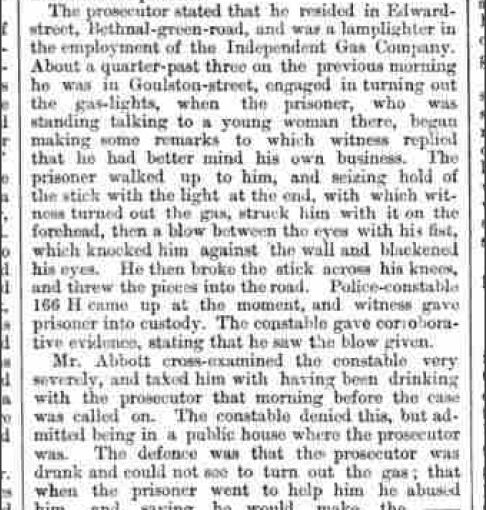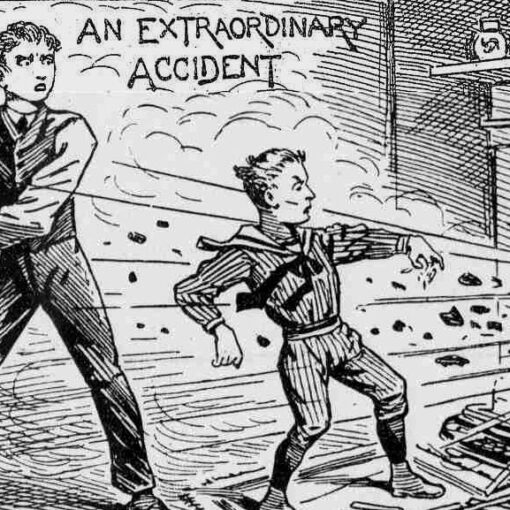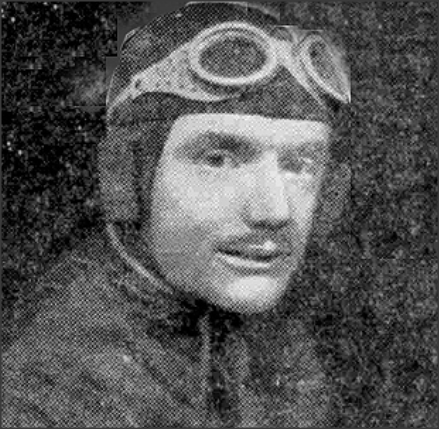Hereford Journal – Wednesday 30 December 1846
LEDBURY.
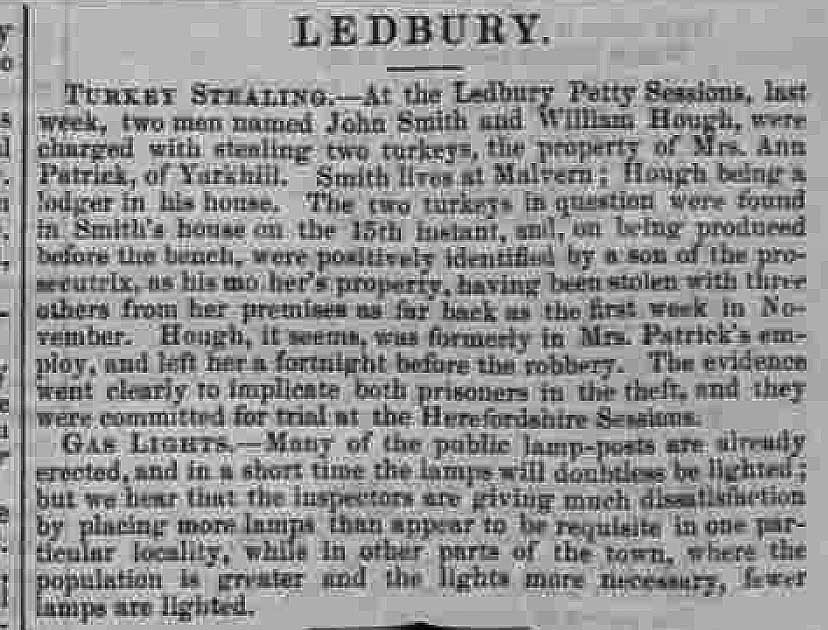
TURKEY STEALING. – At the Ledbury Petty Sessions last week, two men named John Smith and William Hough were charged with stealing two turkeys, the property of Mrs. Ann Patrick, of Yarkhill. Smith lives at Malvern; Hough being a lodger in his house. The two turkeys in question were found in Smith’s house on the 15th instant, and, on being produced before the Bench, were positively identified by a son of the prosecutrix as his mother’s property, having been stolen with three others from her premises at her back in the last week in November. Hough, it seems, was formerly in Mrs. Patrick’s employ, and left her a fortnight before the robbery. The evidence was clearly to implicate both prisoners in the theft, and they were committed for trial at the Herefordshire Sessions.
GAS LIGHTS. – Many of the public lamp-posts are already erected, and in a short time the town will doubtless be lighted; but we fear that the inspectors are fixing much the lights by placing more lamps than appear to be requisite in one particular locality, while in other parts of the town, where the population is greater and the lights more necessary, fewer lamps are lighted.
Explanation and Historical Context:
Turkey Stealing Case:
- The case reported involves two men, John Smith and William Hough, who were accused of stealing turkeys from Mrs. Ann Patrick, a resident of Yarkhill.
- Smith resided in Malvern and had Hough as a lodger in his home.
- The stolen turkeys were found in Smith’s house on the 15th of December and were identified by the prosecutrix’s (Mrs. Patrick’s) son as belonging to her.
- The theft allegedly occurred in late November, and Hough, being a former employee of Mrs. Patrick, had left her service shortly before the crime, raising suspicions.
- Both men were found to be sufficiently implicated and were committed for trial at the Herefordshire Sessions, a local court dealing with such crimes.
Historical Legal Context:
- In mid-19th century England, stealing livestock, such as turkeys, was considered a serious offence, often resulting in significant penalties, including imprisonment or transportation to penal colonies.
- The mention of the Herefordshire Sessions refers to the Quarter Sessions, periodic local court hearings presided over by magistrates to handle criminal and civil cases of medium severity.
Gas Lighting Issue:
- The article also discusses the ongoing installation of public gas lamps in Ledbury.
- Concerns were raised regarding the distribution of the lights, suggesting that they were being concentrated in areas where they were perhaps not as necessary, while more densely populated parts of the town were left inadequately lit.
- This reflects the broader 19th-century trend of urban development and the introduction of gas lighting to improve public safety and extend business hours during the winter months.
Research Insights:
- The mention of gas lighting installations in 1846 indicates a period of modernisation in Ledbury, part of a wider movement across Britain where towns and cities were transitioning from oil lamps to more efficient and reliable gas lighting.
- Social concerns regarding fairness in resource allocation and infrastructure improvements were common in such reports.
The Hereford Journal
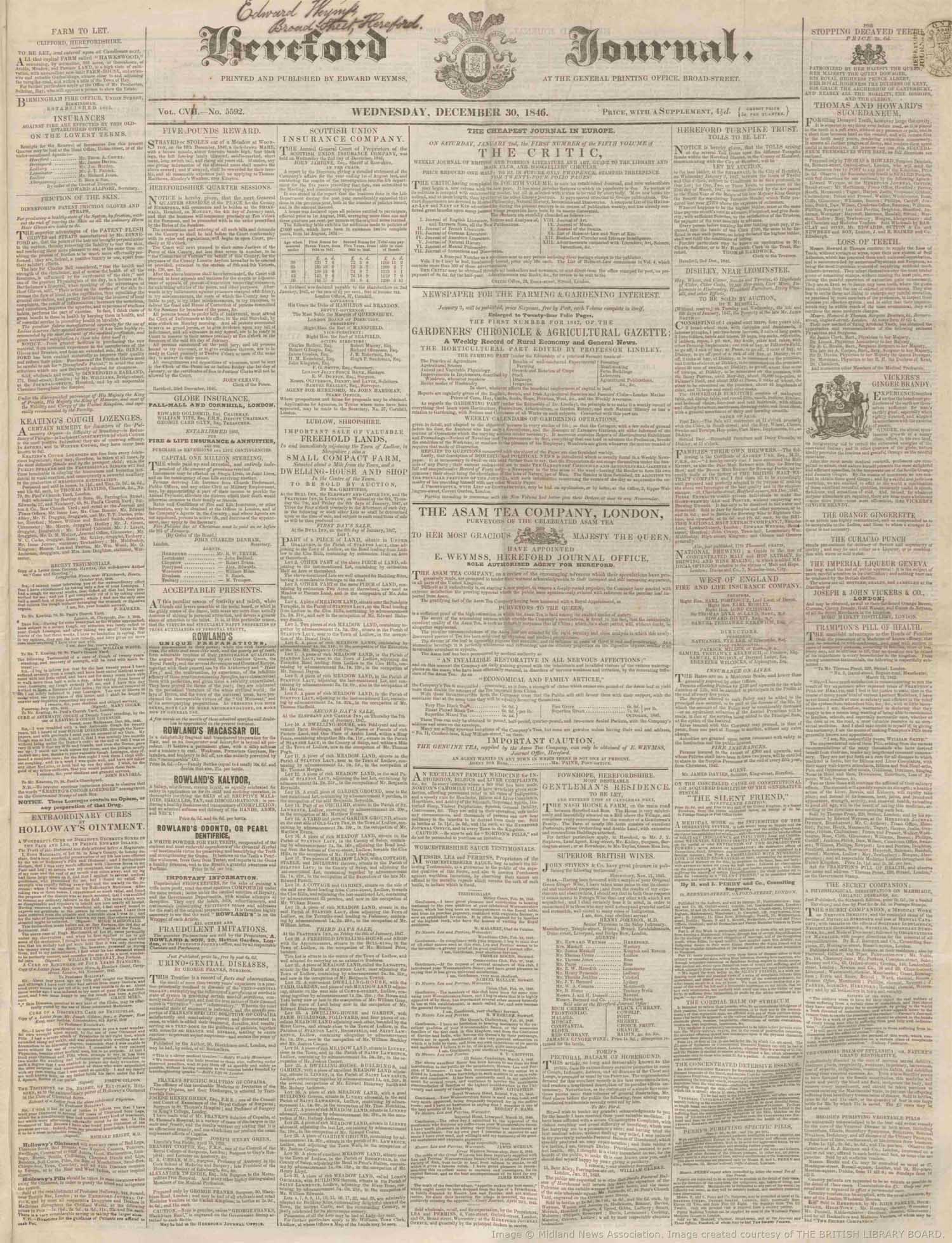
The Hereford Journal was first published in Hereford in the year 1770 as a weekly four-page newspaper by Charles Pugh. Priced at three pence, it was originally known as The British Chronicle or Pugh’s Hereford Journal. The publication had a distinct Conservative stance and primarily featured content such as foreign news, reports from London, advertisements, poetry, and anecdotes. However, it contained very little local news. Like many other provincial newspapers of the era, it presented London news in the order it was received. For instance, in the edition published on 4th January 1781, reports from the London Gazette for Sunday and Monday appeared on page two, while those for Wednesday and Thursday were published on page three. The newspaper was printed in stages, contingent upon the arrival of London papers delivered by the post boy.
Following Charles Pugh’s death in 1788, his sister, Margaret Pugh, who remained unmarried, assumed control of the publication. Between 1788 and 1791, the paper was printed and edited by John Duncumb, who later entered the clergy and became renowned for his unfinished history of Hereford. During this period, printer David Walker was also associated with the Hereford Journal before relocating to Gloucester in 1802, where he took over the Gloucester Journal.
Throughout its existence, the Hereford Journal had several proprietors, some of whom maintained longer associations with the publication than others. By 1890, the newspaper proudly claimed that its circulation surpassed that of its local rivals—the Liberal-leaning Hereford Times and the Hereford Mercury—combined. It also asserted that it was one of the largest penny weeklies in the world.
Eventually, the Hereford Journal was incorporated into the Hereford Times in 1932, bringing an end to its independent publication.
Turkey Theft Shocks Yarkhill: Two Men Await Trial
#TurkeyTheft #LedburyCrime #JusticeForAnn #VictorianCrime #HerefordshireHistory #1846

